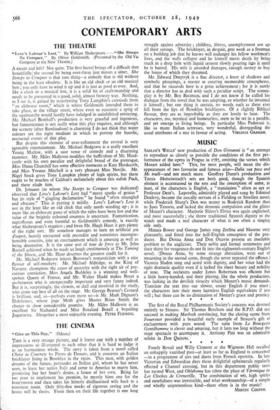MUSIC
SADLER'S WELLS' new production of Don Giovanni is " an attempt to reproduce as closely as possible the conditions of the first per- formance of the opera in Prague in 1787, omitting the scenes which Mozart added later." This, for most people, will mean the dis- appearances of two favourite and famous arias—Dalia sua pace and Mi tradi—and not much more. Geoffrey Dunn's production and Tanya Moiseiwitsch's sets are both good, though the Spanish element is accentuated in the sets and the conception of some, at least, of the characters is English, a " translation " often as apt as Professor Dent's. Leporello, admirably played and sung by Edmind Donlevy, became the rascally servant of a Fielding or Smollett novel, while Frederick Sharp's Don was nearer to Roderick Random than to Juan Tenorio, and lacked the demonic compulsion and the glitter of Mozart's character. Marjorie Shires's Elvira was again anglicised, and most successfully ; she threw traditional Spanish dignity to the winds and made a real character of what is too often a singing role only.
Minnia Bower and George James sang Zerlina and Masetto very pleasantly, and fitted into the half-English conception of the pro- ducer. But Donna Anna and Don Ottavio present an insoluble problem to the angliciser. Their noble and formal sentiments and their thirst for vengeance do not fit into the eighteenth-century English novel. (Donna Anna, by some strange aberration, went out of mourning in the second scene, though she never repeated the offence.) Victoria Sladen sang and acted with dignity, and her voice had the right dramatic quality even if it lacked the sheer beauty and nobility of tone. The orchestra under James Robertson was efficient but a little heavy-handed, and their playing, like the whole production, was lacking in the devilish vivacity which Mozart's music demands. Translate the text into our slower, cosier English if you must ; the characters into their more harmless English equivalents if you will ; but there can be no diminution of Mozart's grace and potency.
* * * *
The first of the Royal Philharmonic Society's concerts was devoted entirely to Strauss. Sir Thomas Beecham and the R.P.O. did not succeed in making Macbeth convincing, but the closing scene from Feuersnot provided a beautiful early example of Strauss's gift of enchantment with pure sound. The suite from Le Bourgeois Gentilhomme is clever and amusing, but it lasts too long without the stage spectacle to accompany it. Anthony Pini was an admirable soloist in Don Quixote.
* * * *
Fanely Revoil and Willy Clement at the Wigmore Hall recalled an unhappily vanished past—at least so far as England is concerned —in a programme of airs and duets from French operetta. In late Victorian and Edwardian days these delightful ephemerals regularly effected a Channel crossing, but in this department public taste has turned West, and Oklahoma has taken the place of Veronique or Les Cloches de Corneville. The combination of wit, high spirits and tunefulness was irresistible, and what workmanship—of a simple and wholly unpretentious kind—there often is in the music!
MARTIN COOPER.






































 Previous page
Previous page